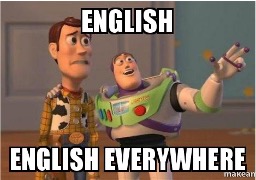English – The Language Behind the Curtains? – by Toni Bader
Language/Business

English nowadays plays an important role insofar that it enables communication between different parties of different first languages, be it between acquaintances, inside workplaces, between different workplaces and even between workplace and clients. A typical workplace of such kind, juggling different groups and therefore using English, is the field of event management. Additionally, there is also a lot of advertisement that can be investigated in terms of use of English. So, my goal for this blog was to compare the internal and external language use and the importance of English in the process of event planning and advertisement for these events. For this, I investigated one particular event location in Basel which hosts all kinds of events like concerts, comedy shows, sports, or even corporate events. I looked at the various posters that can be found all over the city as well as the ads on their website. Regarding the internal use of English, a former employee has kindly agreed to do a short interview with me. This interview was conducted in German and translated by me. The exact event location will remain anonymous.
As a first step, before the interview and thus also without any previous knowledge about the event business, I looked into the website and the advertisements of this event location. The website is available in both German and English, with everything completely translated, even the subtitles – if there are any – and descriptions for the events, even if they are held in German. The posters for these events, which can be found throughout the city as well as on their website, however, are only available in German, with the previously mentioned subtitles not being translated into English either. To me, this makes sense though, since important information, like the date and the artist or kind of event are understandable even with very limited knowledge of German and there is the option to get further information from the English website version. The fact that the whole website can be accessed in English is of course also for the reason of advertising their location and appealing to possible clients that want to host their events there and who are often not from German speaking countries.
For the interview part of my investigation, the employee of this location, explained to me what the process of event planning looks like since I was completely in the dark about this before. She explained that if, for example, an artist decides to go on tour, their management contacts event organizations in the different countries this artist wants to perform in. Those organizers then look for fitting locations (like the one I investigated) and get in contact with them and they then plan the event together. Consequently, there are many parties from different companies and possibly also from different countries involved. English in these cases serves as a lingua franca. My interviewee mentioned that even if their clients were from, for example, the French speaking part of Switzerland, English was preferably used over French (which I found quite interesting, since French is widely spoken in this area).
The interviewee also indicated that even though she herself did not use English on a daily basis, other people in management and the marketing team did to “build up more international cooperation possibilities/partnership”. English in this case is a very important device to establish business relationships. When asked with whom she communicated in English, the answer was: “Usually with potential clients/their management, very often with visitors of these events, never with co-workers (everyone was German speaking), sometimes with representatives of other event locations.” What I thought was especially interesting was that apparently a lot of the people attending these events were not German speaking, as my interviewee mentioned. This aligns with my previous assumption that even though the advertisement in the form of posters is held in German, there is still no problem for people with limited German skills in gathering the most important information from them or the website.
Finally, when asked if English skills were a requirement for her to get this job, she clearly underlined the important role English plays in her field of work: “English-speaking skills are definitely very important in the field of event management, applicants with good English skills are also preferred over ones that do not have those skills.”

To wrap it up, English is very much necessary when working in the event management business, as can be seen by the example of this particular event location. On the external side of things, English is used on their website to give people the opportunity to find out more about them and their events beyond the basic information portrayed on their posters. But the part where English really comes into play is during the whole process of the event being planned. It is the lingua franca that enables business relationships to be established and the various parties involved to communicate properly, something that is crucial in a business that sees so many international guests and visitors. Therefore, English is really what makes the work behind the curtains possible in the first place.
By Toni Bader